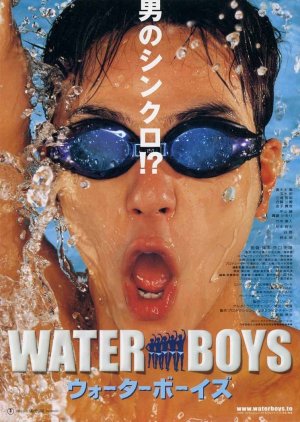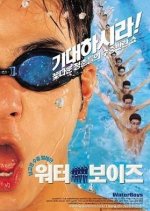 From Zero to Hero: A Retrospective Guide to Yaguchi Shinobu
From Zero to Hero: A Retrospective Guide to Yaguchi Shinobu This movie is about synchronized swimming, but men instead of women. Based on a true story, a group of young high school boys get together to put on a show in their local high school festival. Now, can the boys outshine the ladies in this sport? This comedy will definitely have you laughing throughout, and will prove to be one of the best Japanese movies of 2001. Edit Translation
- English
- magyar / magyar nyelv
- dansk
- Norsk
Cast & Credits
- Tsumabuki SatoshiSuzuki SatoshiMain Role
- Tamaki HiroshiSato KatsumasaMain Role
- Kaneko Takatoshi Main Role
- Miura AkifumiOta YuichiMain Role
- Kondo KoenKanazawa TakashiMain Role
- Hirayama AyaKiuchi ShizukoMain Role
Reviews

I po tolika letech naprosto příjemná pohodovka, která vykouzlí úsměv mnohým divákům nejen na tváři, ale i v duši a touto recenzí napravuji zdejší hodnocení. Není potřeba úplně chápat asijský humor, stačí sledovat piánko, s nadhledem a i když tam je gay složky málo (ale je tam, viz zamilovaný Saotome), celkově může tento film, který mnozí zařazují mezi špičku sportovních komedií dodnes, být bezva potěšením. Viděl jsem film v roce v r. 2015 a nyní znovu a musím říci, že některé hlášky, i když nejsou vždy originální, styl zpracování, herectví, mě vedou stále volit tak vysoké hodnocení.
Was this review helpful to you?

This review may contain spoilers
'Waterboys', the original and its derivatives
The film 'Water Boyy', from 2015, and the drama 'Water Boyy: The Series', broadcast on the GMM 25 network in 2017, both Thai and from the youth genre, comedy, romance, sports and yaoi, are heirs of 'Waterboys' (ウォーターボーイズ?), the 2001 comedy written and directed by Shinobu Yaguchi, about five teenagers who start a synchronized swimming team at their high school.Based on real events that occurred in 1999, the Japanese film recreates the idea from the experience of a group of students from the Kawagoe High School swim team in the city of Kawagoe, Saitama Prefecture, who were inspired by the exhibitions synchronized swimming Olympians on television to create a choreography for "Men's Synchronized Swimming" that they performed at their high school's school festival.
PLOT
Suzuki (Satoshi Tsumabuki) dreams of being a great swimmer, but reality conspires against him: in addition to being the only member of the swimming team at Tadano Boys' High School in Sagara, now the city of Makinohara, Shizuoka Prefecture, He's so slow that in his last competition he literally came out of the water after the pool closed. When he believes that all is lost for him, while retiring after his failure, he sees a team of swimmers practicing synchronized swimming, and is dazzled by the beauty of their movements.
With the arrival at the school of a new Physical Education teacher, Sakuma (Kaori Manabe), it is announced that she will take charge of the swimming club since until now it lacked a coach. Marveled by the young and beautiful teacher, all the students at the school decide to enroll. However, they flee with the same speed when they discover that he plans to turn it into a synchronized swimming team, a popularly feminine sport. In the stampede, Suzuki and four boys who fail to escape in time become part of the brand new "syncro" team.
Along with Suzuki, the other members are: Sato (Hiroshi Tamaki), the failed basketball player; Ohta (Akifumi Miura), a skeletal boy who dreams of some physical activity giving him muscles; Kanazawa (Koen Kondo), a math nerd who can't even float, and Saotome (Takatoshi Kaneko), an effete gay boy.
Against all logic, during her first day of work and a few hours after making the boys promise to become a syncro team and make a presentation for the school cultural festival, Sakuma reveals that she is pregnant and requests maternity leave for the rest of the year. . In this way, the five teenagers are left to their own devices, being the laughingstock of the rest of the students.
Amidst the ridicule of their colleagues, they decide to resign, but at the last minute they agree to move forward. But another setback appears on the horizon: the pool has been assigned to another club that has filled it with fish.
In response to their complaints, Sugita (Tetta Sugimoto), the teacher in charge of the club, agrees to give them the pool if they collect all the fish before the next day to return them to the supplier. Hard task for these slow and "lazy" guys: but the idea arises of taking advantage of the night to drain the pool and collect the fish without effort. Subsequently manipulating the water meter will allow you to refill the pool with water for free and everything will be fixed.
In this chain of absurdities, the boys are discovered and are required to pay for the wasted water. They will be forced to go out and sell tickets door to door. After completing this new mission, they will have to convince Sugita and Isomura (Naoto Takenaka), the supplier of the fish, to return the pool to them. Desperate to prove themselves, they improvise a synchronized swimming routine that ends in disaster. With Sato's head burned and banned from appearing at the festival, they once again think about dissolving the team.
On a date with Shizuko Kiuchi (Aya Hirayama), a beautiful girl from Sakuragi Girls' High School and a martial arts practitioner, Suzuki visits the city aquarium. To his surprise, he finds out that Isomura is the coach there. Seeing his skill with the dolphins and orcas in magnificent routines choreographed by himself, he begs him to train the team. At first he refuses, but finally agrees in exchange for athletic achievements and not questioning his strategy to train them as athletes.
It's time to convince Sato, Ohta, Kanazawa and Saotome to resume training, now with a new teacher. But in the agreement Isomura hides a trick to get rid of them. He will devise tasks in order to make them give up, such as cleaning the windows of all the orca and dolphin tanks in the aquarium under the excuse of strengthening their muscles.
In the first test in the pool, and against all odds, the boys can swim: they have improved their physical condition and by observing the mammals in the tanks they learned to imitate their movements.
Since their original plan failed, Isomura will require them to dance in time, arguing that "it's not synchro if you don't synchronize." But their plan suffers a setback again: Ohta brings his experiences in aerobic routine practices and gives them ease in dancing, which allows them to master the game and develop choreographic skills. Defeated, the coach decides to take his job seriously.
One night Sato, Ohta and Kanazawa discover Suzuki and Saotome talking secretly on the beach. Sato proposes that this is proof of his theory that Saotome is in love with Suzuki and is confessing. But Suzuki reveals that Saotome, whom he has always been in love with, is Sato, but he has never had the courage to declare himself, so he summoned him to tell Sato on his behalf.
The team only needs authorization from the school directors to participate in the sporting event. They achieve this by devising the plan to fake a mass drowning during training on the beach and with the arrival of lifeguards and the press to obtain news about the supposed rescue efforts, taking advantage of the occasion to promote their presentation on television. Pressured by the enthusiasm of the community and the television channels, they have no choice but to authorize them.
With the return to classes after the end of the holidays, many other students ask to join the club wishing to participate. Ohta teaches them the choreographies and Kanazawa calculates the rhythms, patterns and spaces to move. Suzuki, Sato and Saotome investigate the new members' skills to enrich the presentation.
A few days later the men's synchronized swimming team, now large and popular, is fully prepared for its presentation.
But new fears assail Suzuki: although he loves swimming and being part of the club, he is embarrassed to be seen by others, especially by Shizuko, whom he fears will discover him.
To make matters worse, on the eve of the festival, some students accidentally set the school on fire and the firefighters must use the water from the pool to extinguish the fire. Given the impossibility of filling it on time, the event is in danger of being suspended.
But the Sakuragi student council comes to the rescue by offering their pool as they celebrate their own cultural festival on the same day. With the participants and the public moved to the new stage, Suzuki reveals that he does not wish to participate, since the event will take place at the same Shizuko school. Faced with everyone's disappointment, Isomura encourages them and the team performs an amazing choreography that impresses everyone with all kinds of performances.
Just before finishing the aquatic routine, a sudden dip causes Suzuki to lose his swimsuit when he falls into the pool, but Shizuko, sitting in the front row, throws him a swimsuit that she has handmade for him, revealing that she has always She knows about the team and is proud.
The film ends with the team, baptized as Waterboys, thanking the spectators who applaud them, impressed and delighted by their performance.
In addition to the aforementioned Thai audiovisuals, which separate themselves from the original by focusing on swimming and not synchronized swimming, in addition to making explicit what is related to homosexual relationships between their characters, the Japanese film inspired a television series, with a total of three seasons: 'Water Boys', from 2003, 'Water Boys 2', from 2004, and 'Water Boys 2005 Natsu', from 2005.
Was this review helpful to you?



















































